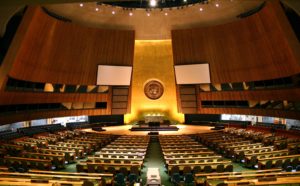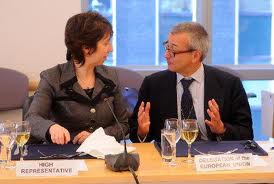 “The EU will have its voice in the General Assembly,” said President of the European Council Herman Van Rompuy. For this first time of its history, the EU will be able to address the UN General Assembly (UNGA). By passing on May 3, 2011, the Resolution 65/276 on “Strengthening of the United Nations System: Participation of the European Union in the Work of the UN,” the UNGA allowed the EU representatives to present EU’s positions at the UN.
“The EU will have its voice in the General Assembly,” said President of the European Council Herman Van Rompuy. For this first time of its history, the EU will be able to address the UN General Assembly (UNGA). By passing on May 3, 2011, the Resolution 65/276 on “Strengthening of the United Nations System: Participation of the European Union in the Work of the UN,” the UNGA allowed the EU representatives to present EU’s positions at the UN.
The adoption of the draft resolution was backed up by 180 UN Members States. However, Syria and Zimbabwe abstained, and 10 others did not vote. This adoption is an important step forward for the UN and the EU for several reasons. First, last year, several UN Member States opposed the move. Last year refusal was a blow for the credibility of the EU in diplomacy months after the implementation of the Lisbon Treaty. But in exactly one year, HR Ashton and her team at the EU Delegation to the UN, led by Mr. Pedro Serrano, Acting Head of the Delegation, managed to overcome it. Second, the adoption this year shows that the EU has managed positively this  failure by reaching out to most of UN Member States and sending a strong message of unity, while explaining the added value of the EU to the UN. From personal experience, I realized that UN Member States’ delegates do not understand the role of the EU. For that reason, one important mission that the EU delegation to the UN has conducted over the year was to reach out to other states and explain what is the EU and its role. For such reason, HR Ashton spent the last days prior the vote in New York in May to continue the lobby towards the other UN Members.
failure by reaching out to most of UN Member States and sending a strong message of unity, while explaining the added value of the EU to the UN. From personal experience, I realized that UN Member States’ delegates do not understand the role of the EU. For that reason, one important mission that the EU delegation to the UN has conducted over the year was to reach out to other states and explain what is the EU and its role. For such reason, HR Ashton spent the last days prior the vote in New York in May to continue the lobby towards the other UN Members.
In term of power, the resolution will allow the EU to become a full UN Member, as opposed to its previous status of observer. The Union will have the right to speak, make proposal, submit amendments, and circulate documents. Even though all these powers are vital, the fact that the EU Council President or the High Representative will now be able to address directly the UNGA equally with other world leaders is an important stepping-stone for the EU’s image as an international actor. Having a voice ultimately means existing and advancing certain issues and policies. However, this enhancement does not include any voting rights for the EU.
With the EU becoming a member, it will be interesting to see how the other regional organizations, such as the Africa Union, CARICOM, ASEAN, MERCOSUR, and so forth, will be seeking for a similar status. Being a nation-state is not a requirement anymore. This raises several important questions: first, will it have an impact on the discussion and value of national sovereignty? All governments, with no exception, cherish their sovereignty. Second, how will regional organizations affect the narratives on international politics and states’ relations?
Several days after the vote, the MEPs were calling for an EU seat on the UN Security Council. A plenary session on May 11 in Strasburg is planned to address this question with HR Ashton. The EU already has a seat at the WTO, NATO, G20 and World Bank, why not at the UNSC? This could become an interesting battle within the Union if pressures are made on France or the UK to give up their seats. The UNSC is undeniably one of the most selective clubs with tremendous political and military powers, which has not evolved since its creation. One can only speculate that in case of reform of the UNSC Brazil, South Africa, Germany or even India would make the cut.